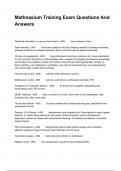Mathnasium Training Exam Questions And
Answers
Individual instruction in a group environment - ANS many classes of one
Team teaching - ANS instructors rotate on the floor, helping students in strategic moments,
students benefit from multiple instructors, Each instructor helps students individually
10 rules of engagement - ANS Use mathnasium teaching constructs, try a new explanation
if it isn't working, fall back on old knowledge when a student is struggling and expand knowledge
with student is succeeding, praise and criticize constructively when appropriate, socratic vs
direct teaching, use mathnasium vocabulary, use tools for visual learning, use metacognition,
use mental math, master team teaching
Half and half model - ANS half HW, half mathnasium activity
Mathnasium model - ANS warmup, warm down, mathnasium activities, HW
Guidelines for instruction delivery - ANS Sit across from students, Supporting and
encouraging voice, Be concise
GENE Teaching - ANS help a student for a while, allow them to be independent, help
someone else, then come back
The Student Binder - ANS Contains material from student learning plan, assembled from
assessment results
Sections 1-5 of binder - ANS Assessments and progress info, Prescriptives in works (grade
specific), A+ splits active packs and new packs, Workout books in works (development
dependent, simple and helps with mathematical thinking), Corrected prescriptives, Corrected
workout books
PKs (prescriptives) - ANS designed like typical math practice pages with increasing
difficulty ranging in length (2-22 pgs) (Don't tell them the PK level)
Instructional pages - ANS help instructors refresh on techniques
Mastery check - ANS mini-assessment, should be done independently
, Focus Ons (FOs) - ANS extra practice, not grade related, general topics, adds depth,
advanced students, code at bottom right of each page
Workout Books (WOBs) - ANS based on student number sense evaluation, part of NSD
series and Intervention series
Student incentive - ANS star punches, red level 1, red 2, black 3, yellow 4, grey 5
Team roles - ANS TT works best when the team is coordinated to support students
Rules of team teaching - ANS Assign team roles, Rotate and read the floor, Engage
students appropriately, Interact with students effectively, Disengage and communicate,
Communication and accountability for student progress, Understand team
roles/accountability/communication, Gives students space to develop without instructor,
Students hear multiple instructor voices, Instructors are productive and precise, Vibrant safe
space
Mathnasium is all about - ANS custom and personalized learning, One on one instruction,
Independent students
Routine - ANS Students program is in their binder, Students pull binder off shelf, Scan in,
Pick up where left off, Work on workout plan
How to rotate and read the floor - ANS Look around see if students have lost
focus/talking/staring into space/asking for help/stuck on one page for a long time, Use
peripheral vision to see if students are raising their hands while engaged with a student
How to appropriately engage students - ANS See how they're doing, Be inviting and non
threatening, Students will be self conscious to ease them in, See what they know to adjust your
vocabulary, Scaffolding by working on easier stuff to work on what they have an issue with
How to disengage and communicate - ANS Once they have it figured out, let them try it on
their own and help someone else, Always leave them with a task
Checking out - ANS Check workout plan goals and see if they've been accomplished,
Make a note on issues if necessary
Instruction Teams - ANS Separate areas or student needs, Higher level students may be
sat separately from lower level, Ratio should not exceed 4:1 students to instructor
Team leader - ANS Center director or experienced instructor, Direct students to seats,
Check students in, Direct instructors, Delegate, Acknowledge students in need, Assist struggling
students




